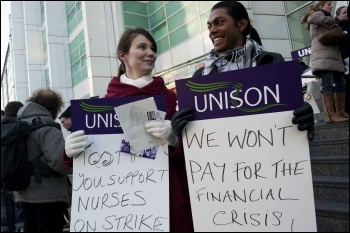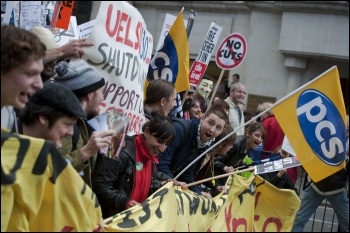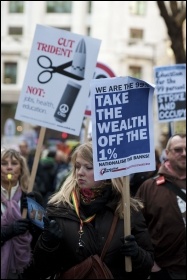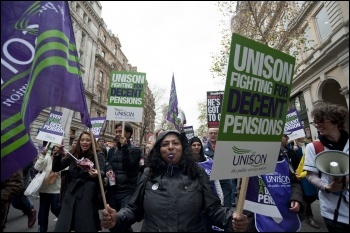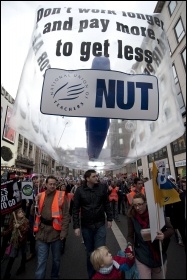Hannah Sell, Socialist Party deputy general secretary
“We are the 99%” – that has been the rallying call of the year. Worldwide, 2011 will go down in history as a year when the poor, the oppressed, the working class – the majority in society – rose up and started to fight back.
In the Middle East, in North Africa, in Southern Europe and also here, in Britain, working class people have begun to demonstrate their potential power to change history.
30 November was the day when around two million public sector workers, members of 30 trade unions, took part in the biggest strike for over three decades. The majority had never taken strike action before, many had never expected to. But they see no other way of both defending pension rights and signalling to the government that they will not accept its plans to destroy public services.
There were massive demonstrations in cities, towns and even villages, with estimates of over 1,000 taking place. In most cases they were the biggest rallies to have taken place for many decades, if not ever. In Bristol over 20,000 marched, in Manchester more than 30,000. In smaller towns there were large demonstrations – 2,000 in Bournemouth, 4,000 in Truro, 1,200 in Birkenhead, 1,000 in Hastings, 1,200 in Warrington, the list goes on.
Many of the strikers were disgusted by the lies, insults and smears not only of Jeremy Clarkson but of the capitalist politicians and media as a whole. But these slurs had very little effect on public opinion. Even the online poll of the anti-strike Daily Mail showed 84% of people supporting the action. The Daily Mail, in its normal unbiased way, responded by quickly deleting the poll.
Nor did the claims that the strike had been a flop have any real impact. On the contrary, even David “damp squib” Cameron was forced to accept it was “obviously a big strike”. No wonder. Official Department of Education figures showed that 62% of schools were completely closed, 14% partially closed, and only 16% definitely open.
The NHS was also disrupted. For example, in London the Metropolitan Police, City of London Police and British Transport Police were all asked by the London Ambulance Service for help when it could not cope with demand.
Approximately 84% of PCS civil service union members joined the strike. Museums and courts were closed or severely disrupted. Only 20 out of the 1,200 staff in the Student Loans Company went into work. The Cabinet Office had its best supported strike ever.
The government claimed that only 18 of 900 job centres were closed. However, the big majority of those that opened were staffed only by management and could not offer a full service. Over 50% of job centres offered no service to the public at all.
At Heathrow more than 90% of PCS members were out. Queues at airports were only minimised because over 20,000 passengers had taken the airlines’ offer to rebook their flights for free.
Whatever brave face the Con-Dems show in public, behind the scenes they were shaken by the massive display of ‘people’s power’.
In one day, 30 November (N30), trade unionists gave a powerful demonstration that – contrary to the government’s propaganda – public sector workers are crucial to keeping the country running. N30 showed that if these workers withdraw their labour, they are capable of bringing the country to a halt.
The private sector as well as the public sector was affected in many ways – including the closing of the Metro and the Tyne Tunnel in the North East, the money lost by the airlines and, above all, by the millions of private sector workers who had to take the day off in order to care for their children.
That is not to say that N30 was 100% solid in every workplace. At national and local level some of the unions participating have not organised a serious struggle for decades. Union officials have in many cases become used to administering defeat rather than fighting to win. Inevitably, as a result, there were many workplaces with no real union organisation.
However, across the country there were reports of workers walking out and organising picket lines in such workplaces. This is a beginning of rebuilding the trade union movement in Britain. Unison membership applications have increased by 126% since the ballot result. The same will undoubtedly be true of the other unions that joined the strike.
Build the unions
The task in workplaces which previously had weak or non-existent union structures is now to build fighting union branches and effective broad lefts, based around the new activists who flooded into action on N30.
This is not a task that can be left for months, or even for weeks. It is urgent. On 29 November, Tory chancellor George Osborne dramatically escalated the Con-Dems’ war on the working class. As the headlines of two national dailies declared, Osborne ‘struck first’ when he stepped up the onslaught on the public sector and workers’ rights.
Therefore the date for the next public sector strike needs to be set immediately and to take place before the end of January. All private sector trade unions with current disputes should also coordinate their action for that date.
The trade union movement needs to make it clear that, if the government doesn’t retreat, it will then step up the action further with a 48-hour public sector strike.
Osborne’s plans draw a picture of unrelenting misery. The number of public sector jobs to be cut has increased by 300,000 to 710,000. A two-year 1% cap on public sector pay increases is to be imposed, ie continuing the pay freeze; measures to make it easier to sack workers are to be introduced; and the increase in the retirement age from 66 to 67 is to be brought forward to 2026.
Working Tax Credits are to be cut back. Osborne announced that the misery of ‘austerity Britain’ would continue for a decade. The already eye-watering £81 billion worth of cuts to the public sector is to be increased by £30 billion.
This horror is combined with a serious threat to the rights of the working class to organise in defence of its rights. The break up of national pay bargaining, along with the increase in public sector job cuts, was tucked away in the Office for Budget Responsibility’s (OBR) report. Osborne adopted the report by the OBR, an unelected quango, wholesale. This is an echo of the rule of the ‘technocrats’, the dictatorship of the markets, in Greece and Italy where unelected bankers have stepped in to force cuts through.
More attacks
N30 – Millions strike back at Con-Dem government on 30 November 2011, photo Paul Mattsson (Click to enlarge: opens in new window)
The break up of national pay bargaining, if it was to go through, would seriously undermine the strength of the trade unions in the public sector. Cameron has now added to this by stepping up the threat to trade unionists’ facility time.
The OBR report also raised the ending of TUPE, which currently guarantees the pay, conditions and pensions of public sector workers whose jobs are privatised. For British capitalism, which lacks profitable fields of investment, privatisation of swathes of the public sector is a juicy and potentially profitable prize, provided that workers’ pay and conditions are driven into the ground. Cameron is openly calling for privatisation of sections of the NHS.
The war that has been unleashed on the trade union movement is an attempt to petrify it. They hope that in face of this onslaught the trade unions will stop fighting back and accept a rotten deal on pensions. The Financial Times on 3 December suggested that if the trade unions are prepared to settle on pensions the government will make ‘further concessions’, guaranteeing the pension rights of privatised workers.
This ‘concession’, even if it materialised, would only be an agreement to withdraw one small part of the onslaught launched on Tuesday, in return for the unions swallowing the destruction of public sector workers’ pensions.
The government has declared war and the only possible response is to escalate the action, both in defence of pension rights, but also broadening the struggle against the government’s austerity onslaught, and in defence of the rights of the trade unions to organise effectively.
More misery
Osborne’s autumn statement has been quickly followed by a series of think tanks announcing that we face a ‘decade of misery’. We have been told that our living standards will be lower in 2015 than they were in 2003. In a complete condemnation of capitalist Britain, 64% of people now believe that their children will be worse off than them. Inevitably, the economic misery capitalism offers is being used as a justification for further attacks on our living standards.
Outrageously, Lord Hutton, author of the attack on public sector pensions and still a Labour member of the House of Lords, has weighed in to argue that, given the economic crisis, the government is offering workers “a good deal” on pensions. Millions of workers, however, are drawing the opposite conclusion – that it is only by conducting a determined struggle that they stand any chance of defending their and their children’s living standards.
Unfortunately, the right-wing trade union leaders are terrified of calling further national action. Unison’s leadership have mooted ‘smart action’ – that is sectional action – as the next step. This would be a serious mistake. Sectional or regional action as a supplement to further national coordination action could be useful, but as a substitute it will demobilise and potentially divide the movement.
The struggle of local authority workers in Southampton is held up as an example of ‘smart’ action. In reality, while Southampton shows the determination of local authority workers to fight, it is a demonstration of the limitations of ‘smart’ action, not of its success.
On N30 millions of workers felt their collective power. At the same time the majority understood that the government would not retreat without further action. The right-wing trade union leaders only took part in N30 as a result of pressure from their members, who were frustrated that they had not been called out for the strike on 30 June. Now that so many trade unionists have had their confidence increased by taking strike action, it will be very difficult for the right-wing union leaders to avoid calling further coordinated action.
Further action
N30 – Millions strike back at Con-Dem government on 30 November 2011, photo Paul Mattsson (Click to enlarge: opens in new window)
Already Unison Scotland has voted unanimously for a further day of coordinated action on 25 January. The National Shop Stewards Network (NSSN) has a vital role to play organising demands for further strike action through a major campaign to get petitions signed and resolutions passed through trade union branches and through lobbying the TUC.
Another crucial task is to put forward an alternative to the ‘austerity capitalism’ offered by all three main parties. The biggest trade unions which participated in N30 are affiliated to the Labour Party, and their members’ money provides the majority of Labour’s funding.
Ed Miliband, under pressure, did not give an outright condemnation of the strike as he did in June – but he made it clear that he did not support it. Instead he suggested that the unions “had fallen into the government’s trap”. Ed Balls, Labour shadow chancellor, has made clear that a Labour government would also slash public sector pensions.
It is now widely understood that the cuts have exacerbated the economic crisis as tax receipts have fallen and the number of benefit claimants increased. Even Osborne has had to tacitly recognise this by including some attempts to stimulate the economy in the autumn statement, alongside huge attacks.
But because Labour, like the Tories and Liberals, accepts the logic of the capitalist market, it accepts the ‘necessity’ of driving down workers’ living standards. It is an indictment of Labour policies, of cuts ‘less far and less fast’, that more voters currently trust the Tories than the opposition on the economy. Although this can change as the crisis deepens and, in desperation, workers look for any outlet to defeat the government.
No to ALL cuts
Socialists, however, along with millions of workers, say NO! Working class people should refuse to pay for an economic crisis which was not of their making. Alongside an industrial struggle, we also need a political voice – otherwise workers are fighting with one hand tied behind their backs. We call on the trade unions to stop funding New Labour, and to begin to stand election candidates that say no to all cuts.
The PCS civil service union has proposed an immediate alternative to Osborne’s £111 billion of cuts. It demands the collection of the massive £120 billion unpaid tax of big business which, if implemented, would negate the need for cuts. The Socialist Party and the whole labour movement support this demand.
However, the speed and depth of the present crisis of capitalism and its devastating effect on the lives of millions of workers in Britain and worldwide, poses sharply the issue not just of immediate measures that offer some relief for working people, but of more profound solutions, of ‘system change’. This means outlining and fighting for a democratic socialist alternative.
It is no coincidence that in the wake of the strike Blairite Labour MP David Miliband, along with pro-Labour columnist Will Hutton and others, have written articles which attempt to dismiss Marxism and socialism as an alternative to the misery that capitalism offers.
The objective case for socialism has never been stronger; hence the rush to condemn it before it gains mass support. However, this will not work. Both Miliband brothers and Will Hutton can only offer a dream of good ‘productive’ capitalism rather than the ‘bad’ speculator-driven capitalism we have today. But this is a utopian dream.
The financiers and the manufacturers are completely intertwined and inseparable. British manufacturing companies gamble on the stock markets and have £60 billion hoarded in their vaults – refusing to invest in new equipment, factories or jobs – because it is not profitable for them to do so.
No amount of pleas from the Miliband brothers will change that. Only by taking the financial system, and the major corporations that dominate the economy, into democratic public ownership would it be possible to begin to fully utilise the science, technique and industry available in order to meet the needs of the majority.
Only the start
2011 has seen the biggest trade union demonstration for decades, possibly over 100 years, and now it has had the magnificent N30 strike. However, 2011 has only been the start. The stage is set for battles that will dwarf those we have seen this year. In the course of them there will be opportunities to win a new generation to socialism. There will also be opportunities to bring down the rotten Con-Dem coalition.
Osborne has made it clear that his government is set on a collision course with the working class. Thatcher did similar when she launched the poll tax, but it turned out to be her downfall thanks to the 18 million-strong army of non-payers, led by Militant (the Socialist Party’s predecessor). Something like this can happen again.
Osborne and Cameron, with Clegg and Co in tow, are determined to talk tough in their battle with Britain’s working class. However, this hides the reality that this is a weak and increasingly hated government. It can be brought down provided that the anger and determination shown on N30 is built on early in 2012.
Splits on the horizon?
It is clear from the autumn spending review that the Tories are preparing to drag the Liberals with them into a second ‘austerity’ government. However, the ranks of the Liberal Democrats have accepted wielding the knife in return for power for one term – but may balk at it carrying on indefinitely. In an attempt to appease his members, Nick Clegg has made a rhetorical attack on the excess pay of CEOs whose companies ‘don’t deliver’.
Meanwhile he continues to sit happily in a government which has presided over average pay increases of 49% for the directors of the FTSE 100 companies – which are only delivering pay squeezes and redundancies for their workforces.
However, as the cuts continue to mean terrible misery for millions – and particularly as the struggle against the cuts increases – there will be real possibilities for splits in the Lib Dems, as there will be for all the pro-big business parties.
The spectre of Europe is haunting the Tories. Around 40% of Britain’s exports go to the eurozone, and its break up would mean a dramatic increase in the economic crisis worldwide and in Britain. As the price of trying to save the eurozone German capitalism is demanding the right to insist that every country in the eurozone carries out Con-Dem-style cuts policies. This, however, will require changes to the Lisbon Treaty, and already the Tory right are agitating for a referendum.
Socialists support the right of the people to vote on changes to the Treaty and oppose the strengthening of this axe-man’s charter, just as the Socialist Party, the Socialist Party’s sister organisation in Ireland, campaigned for a no vote in the two Irish referendums on the Lisbon Treaty.
However, Cameron will be desperate to avoid a referendum and the issue, seemingly separate to the cuts but in fact connected, is likely to dramatically widen the fissures within the Tory party and between it and the Lib Dems.




